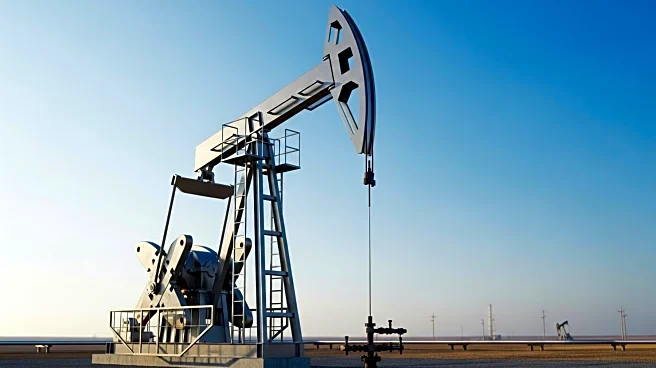What's Happening?
BP Plc has reported weaker oil trading results while experiencing growth in upstream production for the second consecutive quarter. The company highlighted increased gas production from its U.S. shale arm, BPX Energy, in its third-quarter trading update. Despite weak oil trading, BP's gas trading remained average, and the company's shares fell by 2% in early London trading. BP is under pressure to improve performance by reversing previous green investments and increasing oil and gas production. The company has initiated new production at six global projects, expected to add 150,000 barrels per day at peak output. BP has also implemented cost-cutting measures, reducing expenses by $1.7 billion since 2023 and announcing 6,200 job cuts.
Why It's Important?
BP's mixed results reflect the challenges faced by energy companies in balancing investments in traditional oil and gas production with the transition to cleaner energy sources. The company's strategy shift comes amid an oil market potentially heading for oversupply due to increased production by OPEC+. BP's performance is crucial for investors and stakeholders as it attempts to recover from previous low-return clean energy ventures. The company's ability to cut costs and sell assets will be vital in achieving its target of $20 billion in divestments by 2027. BP's stock performance, which outpaced peers like Chevron and Exxon Mobil, indicates investor confidence in its current strategy.
What's Next?
BP plans to expedite its cost-cutting and asset sale strategy, aiming to reduce net debt to a range of $14 billion to $18 billion by 2027. The company will continue to focus on increasing oil and gas production while managing market dynamics and investor expectations. BP's new chairman, Albert Manifold, has emphasized the need for swift action to improve financial performance. Analysts from Jefferies and Barclays have noted steady operations and positive outcomes in the recent quarter, suggesting cautious optimism for BP's future.
Beyond the Headlines
BP's struggles highlight the broader industry challenge of transitioning to sustainable energy while maintaining profitability. The company's pivot away from clean energy investments underscores the complexities of balancing environmental goals with economic realities. BP's experience may influence other energy companies' strategies as they navigate similar transitions.











